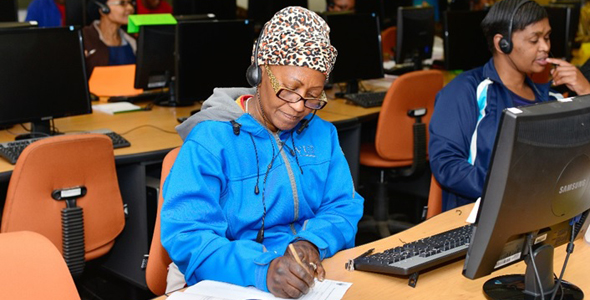The Faculty of Applied and Computer Sciences hosted an e-Literacy programme, e-Skills4All from 24 August to 30 November 2015 to outline how it could be rolled out to service workers.

VUT empowers service workers

Service workers at e-Skills lecture room
The Faculty of Applied and Computer Sciences hosted an e-Literacy programme, e-Skills4All from 24 August to 30 November 2015 to outline how it could be rolled out to service workers.
The programme has been endorsed by the National Electronic Media Institute of South Africa (NEMISA) as the preferred software to train 10 million citizens towards achieving the goals of the National Development Plan.
The first group of learners from the intake wrote their final exam on the 19 November and the second group wrote on 3 December. The remaining learners who feel they are not fully prepared yet will be given an opportunity to write during January 2016.
The pilot programme started with 50 workers who are currently employed at the VUT departments of cleaning, maintenance and gardening services. There will be a further three groups of 50 learners each, spread over three semesters with the remaining staff members enrolled on the programme.
E-Skills4All was developed as a 75-hour interactive training programme that relates specifically to the South African market. It lends itself to a blended environment where learners are able to work on their own but also have a facilitator for guidance.
It has been designed to accommodate different visual capabilities of learners for easier engagement, for example those who are colour blind, dyslexic or visually impaired. The programme consists of five modules covering topics such as Operating a PC, Windows, File and Folder Management, Microsoft Office Tools, Internet and email. Upon completion of the programme the learners will receive an SLP (Short Learning Programme) Certificate.
As required by government, the training programme has been mapped and aligned to the South African Qualifications Authority and National Qualifications Framework, relating specifically to the “End-User Computing” qualification under the Media Information Communication Technologies (MICT) SETA. Automated assessments are being developed in conjunction with the MICT SETA.
Learners interviewed shared a common view that the programme was not easy but certainly a good one and they envisage furthering their computer and information technology studies.




